Reflective Essay: Analyzing Academic Writing Module Experience
VerifiedAdded on 2021/01/01
|6
|1252
|163
Essay
AI Summary
This reflective essay provides an in-depth analysis of a student's experience within an academic writing module. The essay employs Gibbs' Reflective Cycle to examine the student's feelings, evaluations, and analysis of the module. It details the skills developed, such as academic writing, plagiarism avoidance, and referencing, while also addressing challenges encountered, including structuring written work and appropriate source selection. The student reflects on the importance of workshops and feedback in enhancing their academic writing skills. The essay concludes with an action plan for future projects, emphasizing the need for training, feedback, and professional development to improve academic writing, referencing, and plagiarism avoidance. The essay highlights the importance of reflective practice in enhancing academic performance and communication.
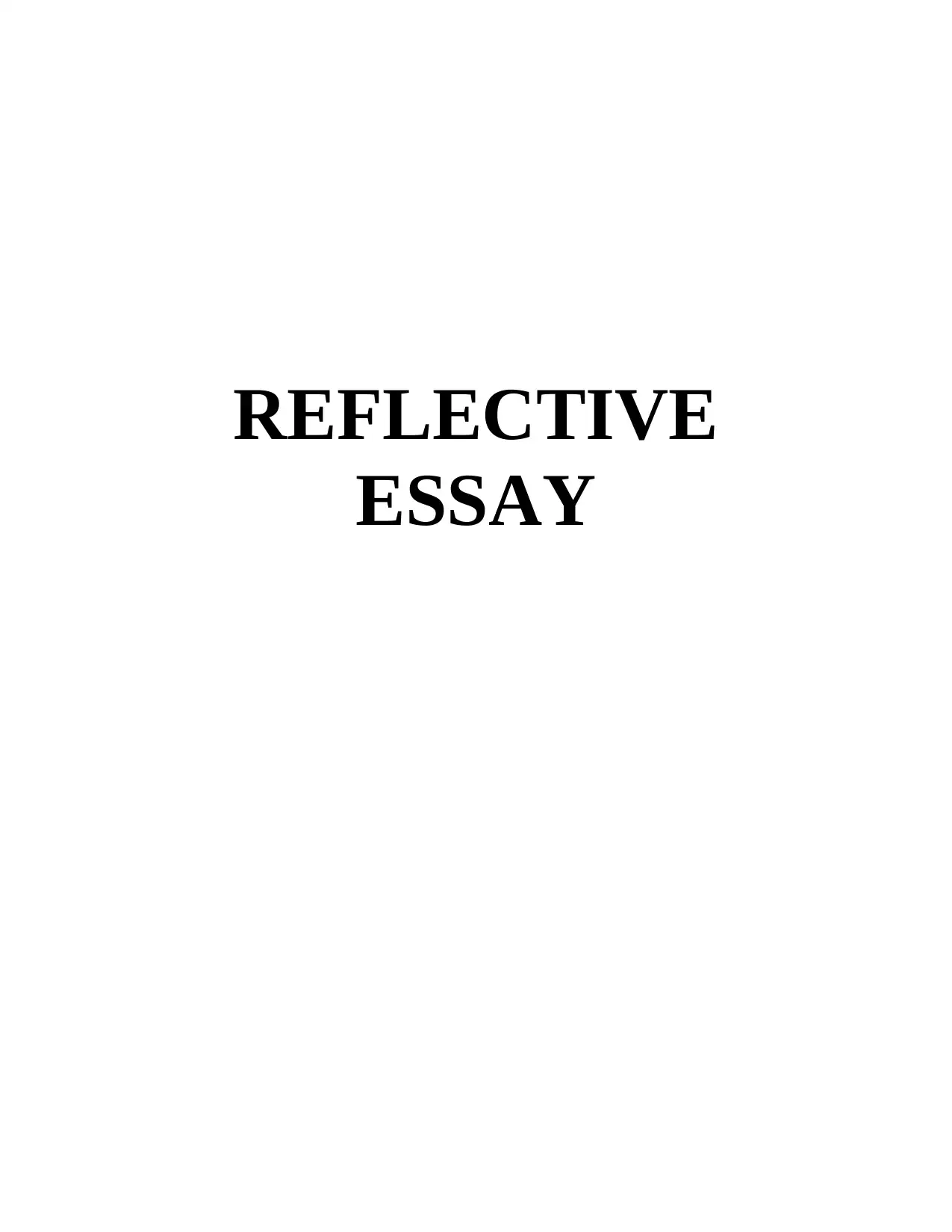
REFLECTIVE
ESSAY
ESSAY
Paraphrase This Document
Need a fresh take? Get an instant paraphrase of this document with our AI Paraphraser
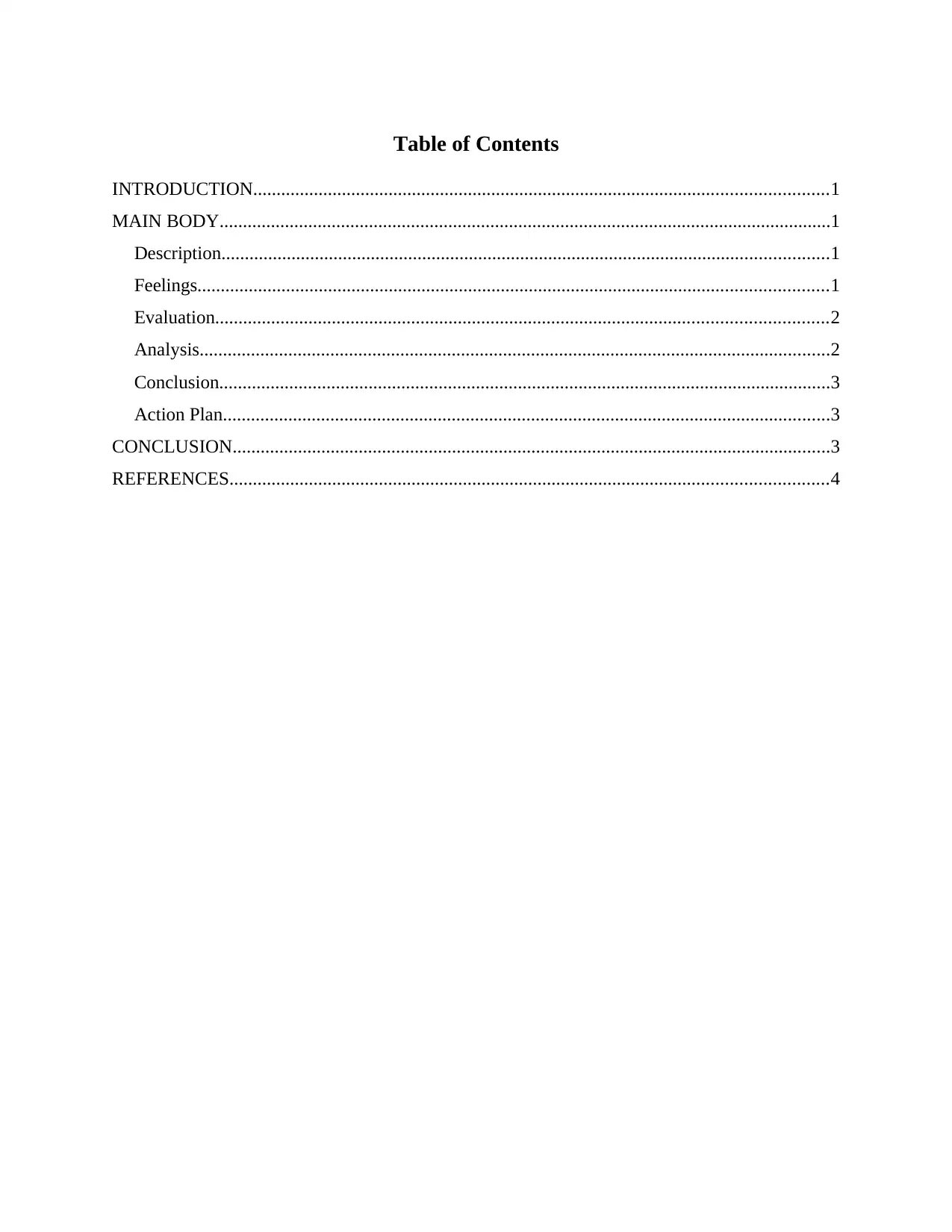
Table of Contents
INTRODUCTION...........................................................................................................................1
MAIN BODY...................................................................................................................................1
Description..................................................................................................................................1
Feelings.......................................................................................................................................1
Evaluation...................................................................................................................................2
Analysis.......................................................................................................................................2
Conclusion...................................................................................................................................3
Action Plan..................................................................................................................................3
CONCLUSION................................................................................................................................3
REFERENCES................................................................................................................................4
INTRODUCTION...........................................................................................................................1
MAIN BODY...................................................................................................................................1
Description..................................................................................................................................1
Feelings.......................................................................................................................................1
Evaluation...................................................................................................................................2
Analysis.......................................................................................................................................2
Conclusion...................................................................................................................................3
Action Plan..................................................................................................................................3
CONCLUSION................................................................................................................................3
REFERENCES................................................................................................................................4
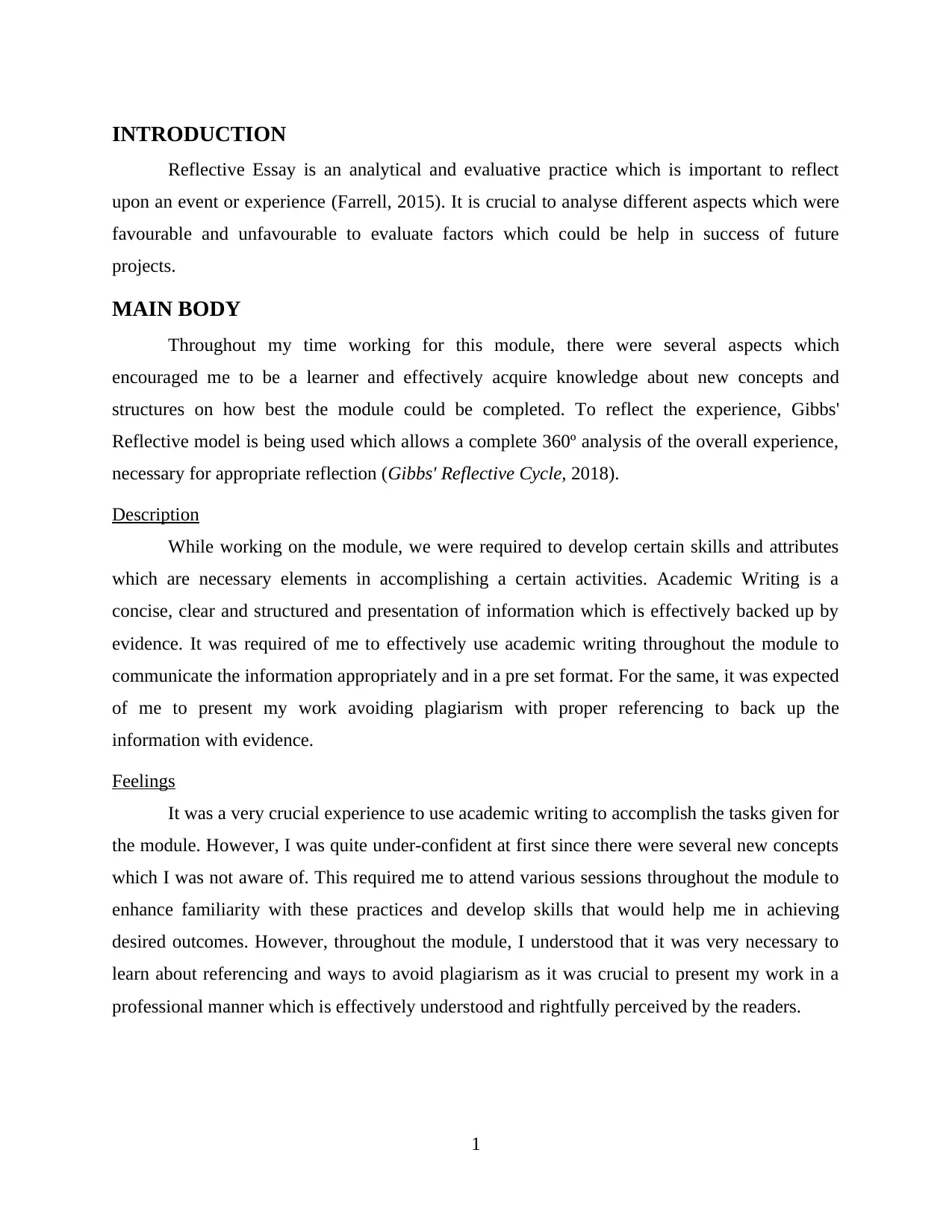
INTRODUCTION
Reflective Essay is an analytical and evaluative practice which is important to reflect
upon an event or experience (Farrell, 2015). It is crucial to analyse different aspects which were
favourable and unfavourable to evaluate factors which could be help in success of future
projects.
MAIN BODY
Throughout my time working for this module, there were several aspects which
encouraged me to be a learner and effectively acquire knowledge about new concepts and
structures on how best the module could be completed. To reflect the experience, Gibbs'
Reflective model is being used which allows a complete 360º analysis of the overall experience,
necessary for appropriate reflection (Gibbs' Reflective Cycle, 2018).
Description
While working on the module, we were required to develop certain skills and attributes
which are necessary elements in accomplishing a certain activities. Academic Writing is a
concise, clear and structured and presentation of information which is effectively backed up by
evidence. It was required of me to effectively use academic writing throughout the module to
communicate the information appropriately and in a pre set format. For the same, it was expected
of me to present my work avoiding plagiarism with proper referencing to back up the
information with evidence.
Feelings
It was a very crucial experience to use academic writing to accomplish the tasks given for
the module. However, I was quite under-confident at first since there were several new concepts
which I was not aware of. This required me to attend various sessions throughout the module to
enhance familiarity with these practices and develop skills that would help me in achieving
desired outcomes. However, throughout the module, I understood that it was very necessary to
learn about referencing and ways to avoid plagiarism as it was crucial to present my work in a
professional manner which is effectively understood and rightfully perceived by the readers.
1
Reflective Essay is an analytical and evaluative practice which is important to reflect
upon an event or experience (Farrell, 2015). It is crucial to analyse different aspects which were
favourable and unfavourable to evaluate factors which could be help in success of future
projects.
MAIN BODY
Throughout my time working for this module, there were several aspects which
encouraged me to be a learner and effectively acquire knowledge about new concepts and
structures on how best the module could be completed. To reflect the experience, Gibbs'
Reflective model is being used which allows a complete 360º analysis of the overall experience,
necessary for appropriate reflection (Gibbs' Reflective Cycle, 2018).
Description
While working on the module, we were required to develop certain skills and attributes
which are necessary elements in accomplishing a certain activities. Academic Writing is a
concise, clear and structured and presentation of information which is effectively backed up by
evidence. It was required of me to effectively use academic writing throughout the module to
communicate the information appropriately and in a pre set format. For the same, it was expected
of me to present my work avoiding plagiarism with proper referencing to back up the
information with evidence.
Feelings
It was a very crucial experience to use academic writing to accomplish the tasks given for
the module. However, I was quite under-confident at first since there were several new concepts
which I was not aware of. This required me to attend various sessions throughout the module to
enhance familiarity with these practices and develop skills that would help me in achieving
desired outcomes. However, throughout the module, I understood that it was very necessary to
learn about referencing and ways to avoid plagiarism as it was crucial to present my work in a
professional manner which is effectively understood and rightfully perceived by the readers.
1
⊘ This is a preview!⊘
Do you want full access?
Subscribe today to unlock all pages.

Trusted by 1+ million students worldwide
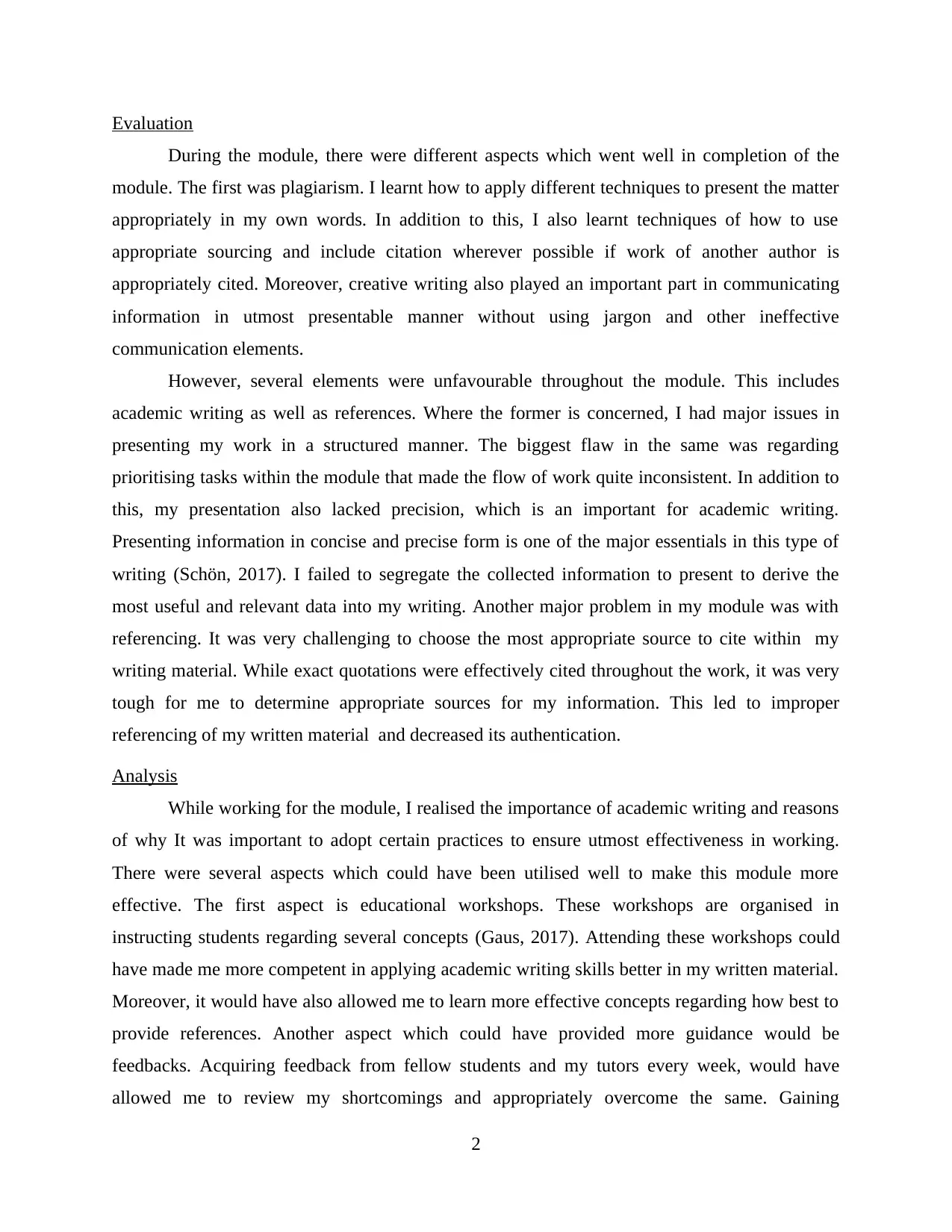
Evaluation
During the module, there were different aspects which went well in completion of the
module. The first was plagiarism. I learnt how to apply different techniques to present the matter
appropriately in my own words. In addition to this, I also learnt techniques of how to use
appropriate sourcing and include citation wherever possible if work of another author is
appropriately cited. Moreover, creative writing also played an important part in communicating
information in utmost presentable manner without using jargon and other ineffective
communication elements.
However, several elements were unfavourable throughout the module. This includes
academic writing as well as references. Where the former is concerned, I had major issues in
presenting my work in a structured manner. The biggest flaw in the same was regarding
prioritising tasks within the module that made the flow of work quite inconsistent. In addition to
this, my presentation also lacked precision, which is an important for academic writing.
Presenting information in concise and precise form is one of the major essentials in this type of
writing (Schön, 2017). I failed to segregate the collected information to present to derive the
most useful and relevant data into my writing. Another major problem in my module was with
referencing. It was very challenging to choose the most appropriate source to cite within my
writing material. While exact quotations were effectively cited throughout the work, it was very
tough for me to determine appropriate sources for my information. This led to improper
referencing of my written material and decreased its authentication.
Analysis
While working for the module, I realised the importance of academic writing and reasons
of why It was important to adopt certain practices to ensure utmost effectiveness in working.
There were several aspects which could have been utilised well to make this module more
effective. The first aspect is educational workshops. These workshops are organised in
instructing students regarding several concepts (Gaus, 2017). Attending these workshops could
have made me more competent in applying academic writing skills better in my written material.
Moreover, it would have also allowed me to learn more effective concepts regarding how best to
provide references. Another aspect which could have provided more guidance would be
feedbacks. Acquiring feedback from fellow students and my tutors every week, would have
allowed me to review my shortcomings and appropriately overcome the same. Gaining
2
During the module, there were different aspects which went well in completion of the
module. The first was plagiarism. I learnt how to apply different techniques to present the matter
appropriately in my own words. In addition to this, I also learnt techniques of how to use
appropriate sourcing and include citation wherever possible if work of another author is
appropriately cited. Moreover, creative writing also played an important part in communicating
information in utmost presentable manner without using jargon and other ineffective
communication elements.
However, several elements were unfavourable throughout the module. This includes
academic writing as well as references. Where the former is concerned, I had major issues in
presenting my work in a structured manner. The biggest flaw in the same was regarding
prioritising tasks within the module that made the flow of work quite inconsistent. In addition to
this, my presentation also lacked precision, which is an important for academic writing.
Presenting information in concise and precise form is one of the major essentials in this type of
writing (Schön, 2017). I failed to segregate the collected information to present to derive the
most useful and relevant data into my writing. Another major problem in my module was with
referencing. It was very challenging to choose the most appropriate source to cite within my
writing material. While exact quotations were effectively cited throughout the work, it was very
tough for me to determine appropriate sources for my information. This led to improper
referencing of my written material and decreased its authentication.
Analysis
While working for the module, I realised the importance of academic writing and reasons
of why It was important to adopt certain practices to ensure utmost effectiveness in working.
There were several aspects which could have been utilised well to make this module more
effective. The first aspect is educational workshops. These workshops are organised in
instructing students regarding several concepts (Gaus, 2017). Attending these workshops could
have made me more competent in applying academic writing skills better in my written material.
Moreover, it would have also allowed me to learn more effective concepts regarding how best to
provide references. Another aspect which could have provided more guidance would be
feedbacks. Acquiring feedback from fellow students and my tutors every week, would have
allowed me to review my shortcomings and appropriately overcome the same. Gaining
2
Paraphrase This Document
Need a fresh take? Get an instant paraphrase of this document with our AI Paraphraser
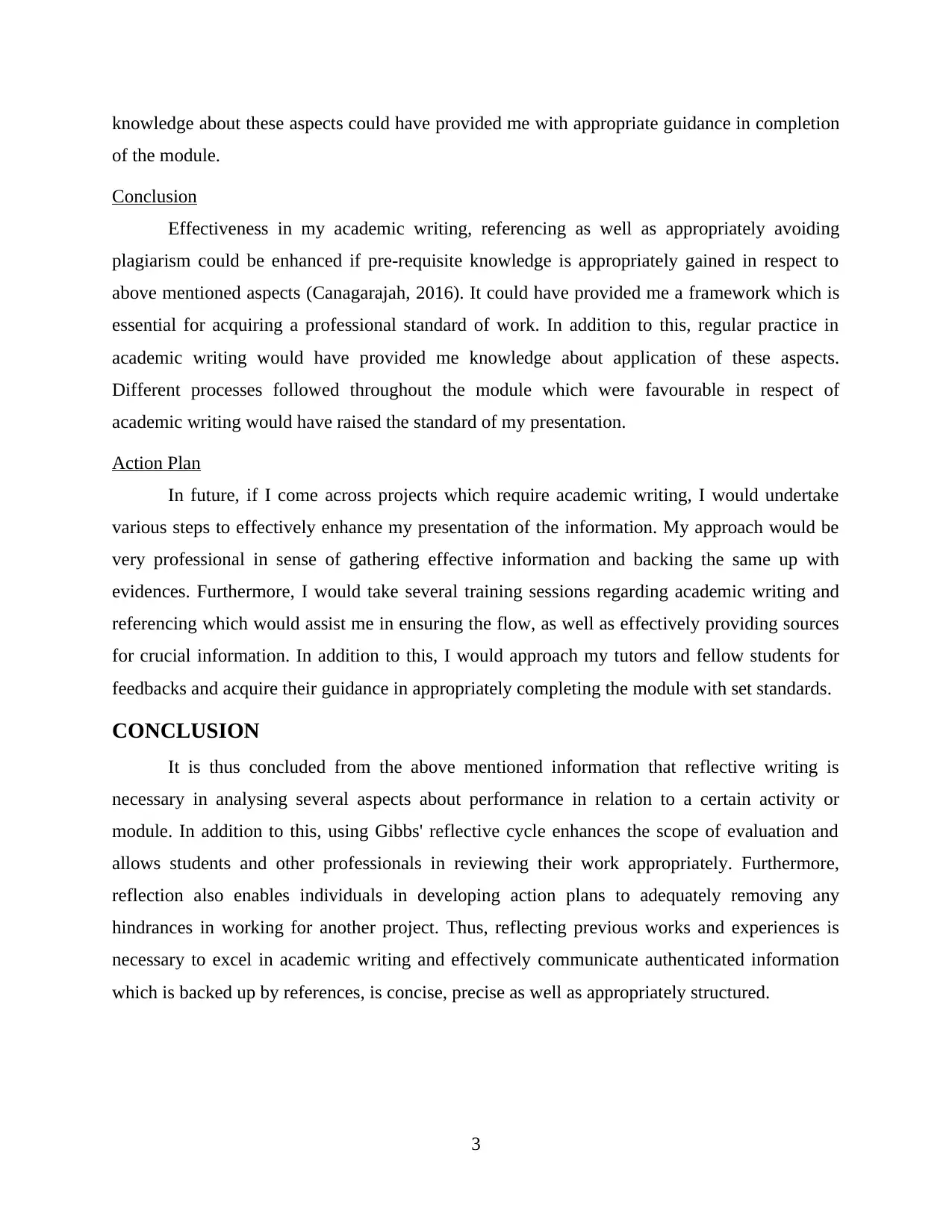
knowledge about these aspects could have provided me with appropriate guidance in completion
of the module.
Conclusion
Effectiveness in my academic writing, referencing as well as appropriately avoiding
plagiarism could be enhanced if pre-requisite knowledge is appropriately gained in respect to
above mentioned aspects (Canagarajah, 2016). It could have provided me a framework which is
essential for acquiring a professional standard of work. In addition to this, regular practice in
academic writing would have provided me knowledge about application of these aspects.
Different processes followed throughout the module which were favourable in respect of
academic writing would have raised the standard of my presentation.
Action Plan
In future, if I come across projects which require academic writing, I would undertake
various steps to effectively enhance my presentation of the information. My approach would be
very professional in sense of gathering effective information and backing the same up with
evidences. Furthermore, I would take several training sessions regarding academic writing and
referencing which would assist me in ensuring the flow, as well as effectively providing sources
for crucial information. In addition to this, I would approach my tutors and fellow students for
feedbacks and acquire their guidance in appropriately completing the module with set standards.
CONCLUSION
It is thus concluded from the above mentioned information that reflective writing is
necessary in analysing several aspects about performance in relation to a certain activity or
module. In addition to this, using Gibbs' reflective cycle enhances the scope of evaluation and
allows students and other professionals in reviewing their work appropriately. Furthermore,
reflection also enables individuals in developing action plans to adequately removing any
hindrances in working for another project. Thus, reflecting previous works and experiences is
necessary to excel in academic writing and effectively communicate authenticated information
which is backed up by references, is concise, precise as well as appropriately structured.
3
of the module.
Conclusion
Effectiveness in my academic writing, referencing as well as appropriately avoiding
plagiarism could be enhanced if pre-requisite knowledge is appropriately gained in respect to
above mentioned aspects (Canagarajah, 2016). It could have provided me a framework which is
essential for acquiring a professional standard of work. In addition to this, regular practice in
academic writing would have provided me knowledge about application of these aspects.
Different processes followed throughout the module which were favourable in respect of
academic writing would have raised the standard of my presentation.
Action Plan
In future, if I come across projects which require academic writing, I would undertake
various steps to effectively enhance my presentation of the information. My approach would be
very professional in sense of gathering effective information and backing the same up with
evidences. Furthermore, I would take several training sessions regarding academic writing and
referencing which would assist me in ensuring the flow, as well as effectively providing sources
for crucial information. In addition to this, I would approach my tutors and fellow students for
feedbacks and acquire their guidance in appropriately completing the module with set standards.
CONCLUSION
It is thus concluded from the above mentioned information that reflective writing is
necessary in analysing several aspects about performance in relation to a certain activity or
module. In addition to this, using Gibbs' reflective cycle enhances the scope of evaluation and
allows students and other professionals in reviewing their work appropriately. Furthermore,
reflection also enables individuals in developing action plans to adequately removing any
hindrances in working for another project. Thus, reflecting previous works and experiences is
necessary to excel in academic writing and effectively communicate authenticated information
which is backed up by references, is concise, precise as well as appropriately structured.
3
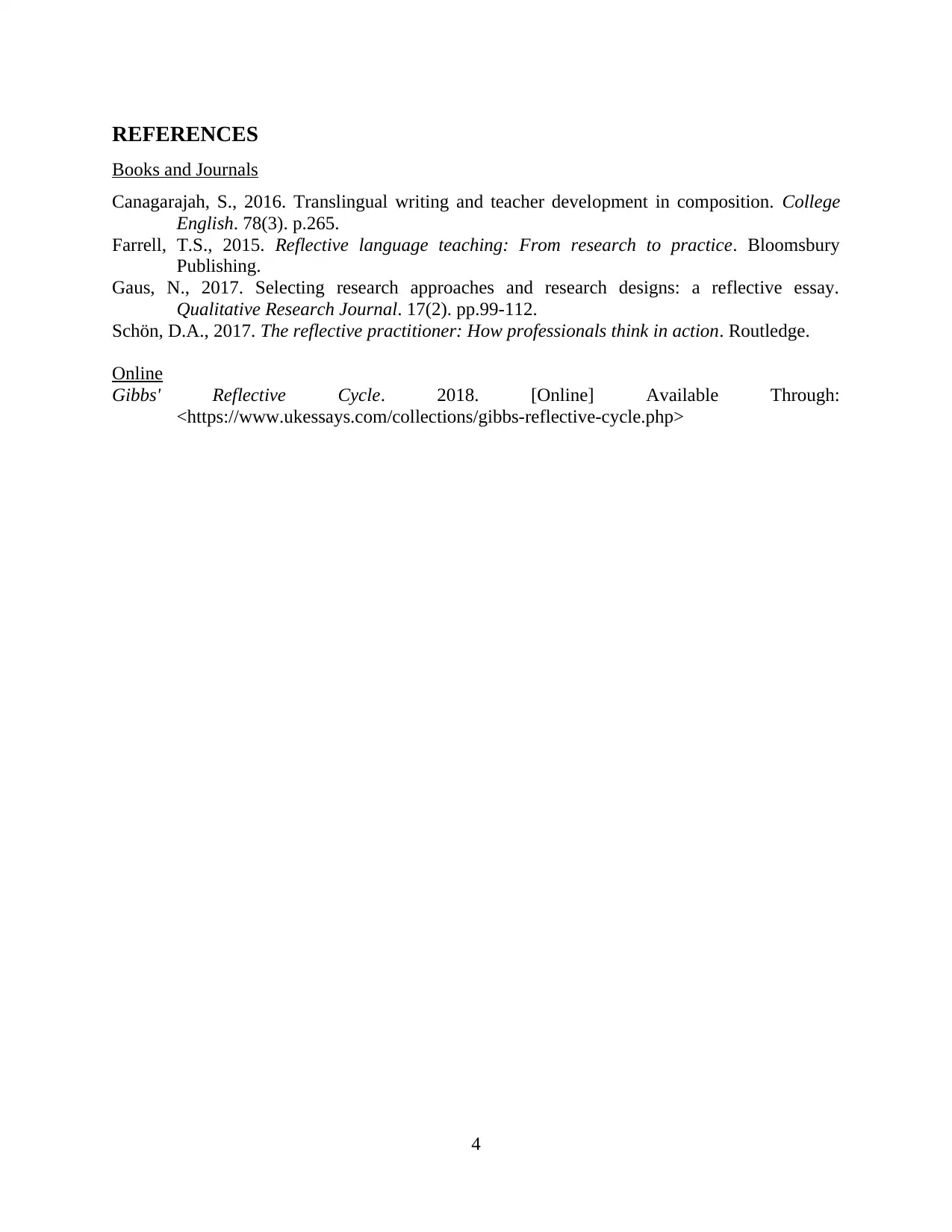
REFERENCES
Books and Journals
Canagarajah, S., 2016. Translingual writing and teacher development in composition. College
English. 78(3). p.265.
Farrell, T.S., 2015. Reflective language teaching: From research to practice. Bloomsbury
Publishing.
Gaus, N., 2017. Selecting research approaches and research designs: a reflective essay.
Qualitative Research Journal. 17(2). pp.99-112.
Schön, D.A., 2017. The reflective practitioner: How professionals think in action. Routledge.
Online
Gibbs' Reflective Cycle. 2018. [Online] Available Through:
<https://www.ukessays.com/collections/gibbs-reflective-cycle.php>
4
Books and Journals
Canagarajah, S., 2016. Translingual writing and teacher development in composition. College
English. 78(3). p.265.
Farrell, T.S., 2015. Reflective language teaching: From research to practice. Bloomsbury
Publishing.
Gaus, N., 2017. Selecting research approaches and research designs: a reflective essay.
Qualitative Research Journal. 17(2). pp.99-112.
Schön, D.A., 2017. The reflective practitioner: How professionals think in action. Routledge.
Online
Gibbs' Reflective Cycle. 2018. [Online] Available Through:
<https://www.ukessays.com/collections/gibbs-reflective-cycle.php>
4
⊘ This is a preview!⊘
Do you want full access?
Subscribe today to unlock all pages.

Trusted by 1+ million students worldwide
1 out of 6
Related Documents
Your All-in-One AI-Powered Toolkit for Academic Success.
+13062052269
info@desklib.com
Available 24*7 on WhatsApp / Email
![[object Object]](/_next/static/media/star-bottom.7253800d.svg)
Unlock your academic potential
Copyright © 2020–2025 A2Z Services. All Rights Reserved. Developed and managed by ZUCOL.





